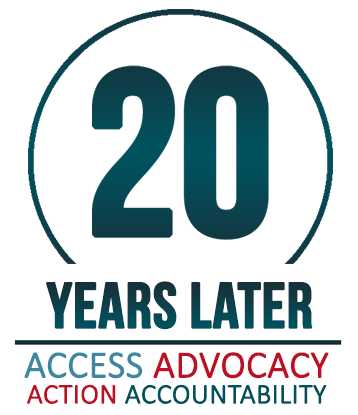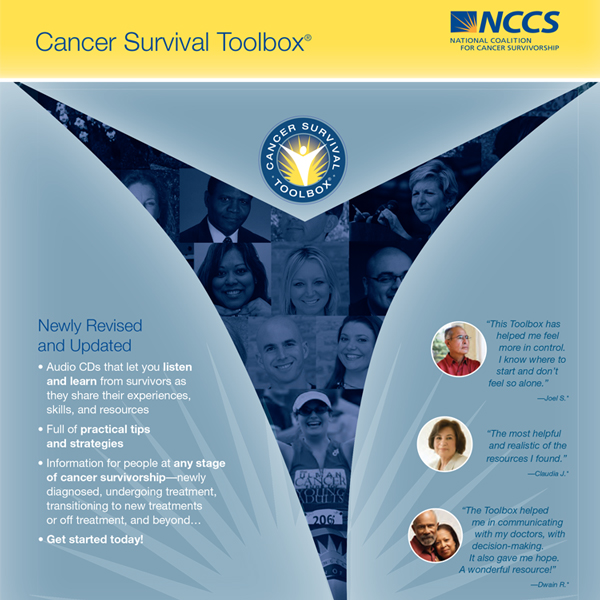Revisiting the Fifth Principle of the Imperatives for Quality Cancer Care
This month, as part of the 20 Years Later blog series, we are revisiting the fifth principle of the Imperatives for Quality Cancer Care: Access, Advocacy, and Accountability. This principle states: “People with cancer should be provided a range of benefits by all health care plans that includes primary and secondary prevention, early detection, initial treatment, supportive therapies to manage pain, nausea, fatigue and infections, long-term follow up, psychosocial services, palliative care, hospice care, and bereavement counseling.”
We will consider the components of care and assess the availability in today’s health care plans of the following:
- Primary and Secondary Prevention
- Supportive Care (psychosocial)
Primary and Secondary Prevention
Primary and secondary preventative measures are actions and interventions designed to prevent cancer from occurring in the first place, or to identify the disease at the earliest stages, with the goal of reducing the impact of the disease.

In 2015, we’re revisiting the influential “Imperatives for Quality Cancer Care” publication. Read more posts from our “20 Years Later” series.
Since 1991, NCCS has appeared before the Senate and House Committees on Appropriations for the National Institutes of Health to testify on behalf of specific requests for increased research funding to identify the causes of cancer, as well as issues related to diagnosis, prevention, and continued care for cancer patients and their families. An important step toward increasing access to preventive care is the 2010 Affordable Care Act (ACA), which requires that all plans purchased through the Marketplace and some others cover a variety of free preventive services. These include annual wellness visits, cervical and colorectal cancer screening, diet, obesity, and tobacco use screening, and immunization vaccines—all of which are provided without cost-sharing obligations.
Cancer screening is now a complicated process that includes a range of procedures from imaging, to physical exams, to bloodwork and, most recently, to genetic testing. We have closely monitored the Food and Drug Administration (FDA) efforts to develop a strong regulatory framework for Laboratory Developed Tests (LDTs)—sometimes used to diagnose genetic causes of cancer—to encourage more certainty and predictability. We believe the thoughtful and cautious oversight of these tests can reduce harm to patients. If these tests do not accurately diagnose cancer or properly identify a genetic mutation, a patient could be improperly treated, receiving either unnecessary treatment or no treatment at all.
Additionally, there is much to be determined with regards to defining the risks and benefits of screening. For example, mammography and breast cancer screening remains a highly contested issue, with concerns that women are often overdiagnosed, or overtreated for cancers that will not cause harm. Proponents argue that early detection unequivocally saves lives. The discourse surrounding this and other screening issues will continue to change as new technologies and findings emerge, and will require continuous monitoring by patient advocates to ensure that the consumers of these procedures are receiving the right care at the right time.
While progress is being made in making preventive services accessible, responsibility still falls on the patients. Individuals putting off doctors visits, or opting out of screenings altogether, highlight an issue in public health – individual responsibility and consumer awareness. NCCS and other organizations are dedicated to ensuring patients have access to preventive services, that screening guidelines are evidence-based, and that patients are informed of risks and benefits associated with screening.
Supportive Care (psychosocial)
Cancer patients and physicians are becoming more aware of supportive care and psychosocial needs as an integral part of quality cancer care. This includes the emotional stress of living with a diagnosis of cancer and its treatment, fear of recurrence, anxiety about financial obligations, and the distress imposed on patients and their families of living with the day-to-day physical problems cancer may cause. Assessing the psychosocial concerns and coping mechanisms of patients is of increasing interest to researchers and patient groups who believe this component of care has been long subject to neglect.

The supporting documents for the Cancer Survival Toolbox include distress screening resources.
NCCS and other organizations have incorporated screening and psychosocial support tools into patient resources. The support documents for the Cancer Survival Toolbox© include the National Comprehensive Cancer Network (NCCN) Guidelines®, a distress management tool that addresses practical, family, emotional, and physical problems, as well as spiritual and religious concerns. Additionally, the Teamwork publication and Pocket Cancer Care Guide iPhone mobile app include a series of questions designed to help facilitate conversations between patients and care providers.
We know that supportive care, including psychosocial care and late and long-term effects are critical to ensuring positive patient outcomes. Survivors and their families should also receive palliative and hospice care when the time is right, and bereavement counseling if necessary. We believe that all cancer patients should receive a cancer care plan to guide their treatment and help coordinate their care. For this reason, we support the Oncology Care Model (OCM), which would require practices to document a care plan that covers diagnosis, treatment goals, plans of treatment, quality of life considerations, care coordination, and psychosocial concerns.





